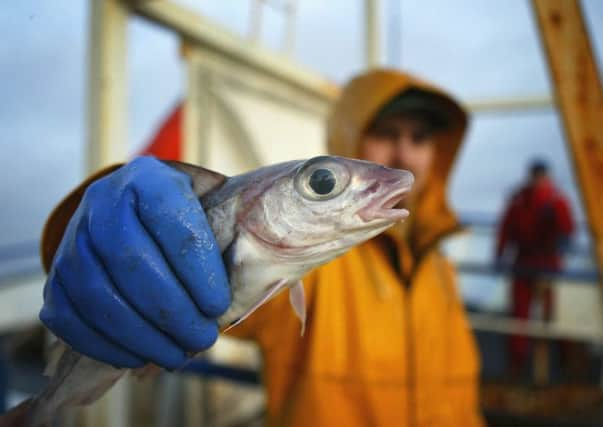Kenny MacAskill: Fishing fell for false promise of Brexit safe haven


As commentators said, it’s totemic in Scotland and whilst not the powerhouse it once was, it’s still a sector that resonates within the national soul. As mining did in the Central Belt, fishing did in our coastal communities, playing a huge part in the formation of modern Scotland.
It’s part of our identity, stories and songs – many people have family links, even if much of the industry has been consigned to our history.
Advertisement
Hide AdAdvertisement
Hide AdOf course, what remains still matters and is significant, not just for areas like the North East and Shetland but for the economy of the entire country, through its valuable exports.
So, the row matters as jobs, communities and the national interest depend upon it, never mind the feeling that it’s part of who we are.
But, the problem has always been that whilst it’s important in Scottish political waters, it is peripheral in UK ones. There are pockets of England from the South West to the North Sea coast where it’s significant, but in the overall national ‘catch’ it’s marginal. It’s been ever thus as the sell-out of the British, never mind Scottish, fishing fleet came about long before the most recent announcement landed.
When Britain first joined the EU, representations were made about the consequences of what was being signed up to. After all, it was primarily that which saw Norway vote no in their referendum. But, the UK signed regardless and chose to blame the EU. Some restriction of powers and ceding of rights was inevitable with membership and would have happened regardless.
The wholesale sell-out, though, was a British choice – not an EU dictat. The extent of the sell-out wasn’t the fault of any EU bureaucrats or even the negotiators from other lands seeking access to our prized fishing waters. The culpability rests fully and squarely with British representation, which traded it away for more lucrative trade deals or other markets that were sought by them. Then, as now, fishing and especially Scottish fishing was marginal and dispensable.
But, the British largely avoided the blame and deftly let that fall on the big bad EU. Bitterness understandably grew in fishing communities as stocks and boats declined. The visible manifestation of their woe was the foreign trawlers that were hoovering up the catch and sinking the competition from often smaller Scottish boats, sometimes compounded by net sizes being used that devasted fish stocks that had sustained communities for centuries. The Scottish fleet was battered by the elements through many years until they thought they could see a safe harbour in Brexit.
But it was never going to be and in that they were lied to and that’s why their anger is understandable. Assurances were given and clear steers made of what might be possible with a Leave vote; but it was never to be.
It’s understandable why many in the fishing community backed it, it was any port in a storm. The bitterness and anger they felt had a target and it appeared that hope, if not salvation, was at hand. What’s inexplicable though is why some senior fishing industry leaders believed the promises made.
Advertisement
Hide AdAdvertisement
Hide AdThey should have known better and stand, if not culpable, then most certainly exposed as patsies.
The positioning of the Scottish Fishermen’s Federation on the EU and Brexit was perhaps understandable. But their overt support for the Tories – this was not a simple dalliance – in the 2017 election was unforgivable. For sure they had always disagreed with the SNP’s position on the EU and it wasn’t helped by the party’s almost unquestioning support for it under Nicola Sturgeon.
However, the SNP’s elected representatives in the North East had been stalwart champions of the sector, who knew the industry well and had been as supportive as they could be through stormy political waters. They were badly treated by those fishing leaders who discovered fair-weather friends in the Tories, championed them and now cry betrayal. Those defeated SNP MPs deserved better from those in prominent positions in supposedly politically neutral organisations.
The Tory outrage is frankly pathetic. Hard Brexiteers must have known that Scottish fishing waters would be dispensable with bigger trading deals sought. Likewise, colleagues who opposed Brexit have been supine and subservient as fall-back position after fall-back position has fallen until they stand on the shores of a hard Brexit. There’s no price too high to pay if demanded by their London masters.
Sadly saying “I told you so” gives no comfort to those who have suffered or an industry in need. In the political debate, the SNP is right to call out the Tories but it benefits the fishing communities not one iota.
Moreover, for many, both past and present, in the industry, the SNP’s pro-EU stance offers no visible salvation. Most certainly, an independent Scotland would defend its fishing waters and its industry more resolutely but not to the extent sought by many. Progress could be made, but a return to the glory days there wouldn’t be.
It’s for that reason that my mood is one of profound sadness. The industry will survive but not as it should be. The sell-out will be extended or enshrined and talk of Scottish control simply is a fog to obscure what will be done by the time any influence or control is gained.
The days of the great herring fleets are never coming back. Not just foreign boats but foreign crews now often operate. Some who plied their trade in inshore waters are now in fish farming or shell fish. Others have given up the trade and who can blame them, for despite the songs and tales it was cold, hard and dangerous work.
Unlike mining it’s not entirely disappeared but as with that great sector, I can’t help think of the phrase “lions led by donkeys”.
